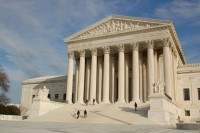Adam Thierer's Blog, page 168
September 21, 2010
Look to the Marketplace, Not Government, For Better Privacy
 As the Internet evolves and new data collection technologies emerge, privacy concerns are increasingly in the spotlight.
As the Internet evolves and new data collection technologies emerge, privacy concerns are increasingly in the spotlight.
 Few doubt that these concerns are, in many cases, legitimate. The major point of contention is which institutions in society are best equipped to address the privacy challenges of the information age. While a number of privacy scholars point to stricter federal regulation as the
Few doubt that these concerns are, in many cases, legitimate. The major point of contention is which institutions in society are best equipped to address the privacy challenges of the information age. While a number of privacy scholars point to stricter federal regulation as the  answer, others are very skeptical of granting government a more expansive role in safeguarding s...
answer, others are very skeptical of granting government a more expansive role in safeguarding s...
September 20, 2010
Radley Balko on Recording the Cops
Don't miss Radley Balko's run-down on recording law enforcement at work.
The challenge is out there for rights groups and coders: fine-tune camera technology and remote storage so that evidence of police and government-agent behavior remains under the control of citizens and available to the public and courts.







The end of software ownership
My article for CNET this morning, "The end of software ownership…and why to smile," looks at the important decision a few weeks ago in the Ninth Circuit copyright case, Vernor v. Autodesk. (See also excellent blog posts on Eric Goldman's blog. Unfortunately these posts didn't run until after I'd finished the CNET piece.)
The CNET article took the provocative position that Vernor signals the eventual (perhaps imminent) end to the brief history of users "owning" "copies" of software that they ...
Kimberley Isbell on news aggregators
 On the podcast this week, Kimberley Isbell, a fellow at the Berkman Center for Internet and Society working as a staff attorney with the Citizen Media Law Project, discusses legal implications of news aggregators. The rise of aggregators amid the transformation of news and journalism spurred Rupert Murdoch to label news aggregation "theft." In her recent paper, Isbell classifies various types of news aggregators and examines their roles in light of copyright, fair use, and hot news...
On the podcast this week, Kimberley Isbell, a fellow at the Berkman Center for Internet and Society working as a staff attorney with the Citizen Media Law Project, discusses legal implications of news aggregators. The rise of aggregators amid the transformation of news and journalism spurred Rupert Murdoch to label news aggregation "theft." In her recent paper, Isbell classifies various types of news aggregators and examines their roles in light of copyright, fair use, and hot news...
September 18, 2010
EFF-PFF Amicus Brief in Schwarzenegger v. EMA Supreme Court Videogame Violence Case
Yesterday, the Progress & Freedom Foundation (PFF) and Electronic Frontier Foundation (EFF) filed a joint amicus brief with the U.S. Supreme Court urging the Court to protect the free speech rights of videogame creators and users and asking the justices to uphold a ruling throwing out unconstitutional restrictions on violent videogames. At issue is a California law that bans the sale or rental of "violent" videogames to anyone under the age of 18, among...
September 16, 2010
The Tea Party Movement: Open-Source Politics
If you follow me on Twitter, you'll see in among the last several weeks' dreck some Tweets skeptical of various themes about the Tea Party movement—chiefly that they're significantly racist/xenophobic, or that they're handmaidens of figures like Glenn Beck or Sarah Palin.
I may have been bending over backwards to resist attempts to define the Tea Party movement. In secret, I've thought about parallels to punk rock, which seemed at times to have as many strains as people. Part of being punk...
September 15, 2010
Competition
I'm in front of a non-TiVo-enabled television this evening, which has permitted me to see ads for a search site called YP.com. It's a rebranded YellowPages.com, affiliated with AT&T, and it's organized to be a search engine for the things in your life—dining, travel nightlife—distinguished from Google's utilitarian-tech web search. Meanwhile Microsoft's Bing has overtaken Yahoo! as the number two search engine. I was surprised to learn that "undisputed search king" Google has only 65 percent ...
Zoned Out of Wireless: Why I Don't Use My Cellphone At Home
Americans are increasingly cutting the cord on their phones. By the most recent estimates, 40 percent Americans rely primarily on their wireless phone for voice calls, and most of those don't have a wireline phone at all.
But don't count me in that number. Its not that I wouldn't like to cut the cord. It's that I can't. I live in a cellular hole, one of those thousands of places where wireless connections are weak or non-existent. The reason isn't geography – I live in a...
September 13, 2010
Caren Myers Morrison on Jury 2.0
 On the podcast this week, Caren Myers Morrison, assistant professor at Georgia State University College of Law, discusses how internet tools are affecting our jury system, which she details in her new paper, Jury 2.0. She cites examples of jurors using the internet to seek information about cases, Facebook-friending witnesses and defendants, and even blogging about trials on which they are deliberating. She also expounds upon jury tradition in America, the evolution of impartiality's...
On the podcast this week, Caren Myers Morrison, assistant professor at Georgia State University College of Law, discusses how internet tools are affecting our jury system, which she details in her new paper, Jury 2.0. She cites examples of jurors using the internet to seek information about cases, Facebook-friending witnesses and defendants, and even blogging about trials on which they are deliberating. She also expounds upon jury tradition in America, the evolution of impartiality's...
September 11, 2010
Government Transparency as the Object of Computing
J. C. R. Licklider (1915-1990) was early to expound on the potential of computing. His papers "Man-Computer Symbiosis" and "The Computer as a Communications Device" (both collected here) foresaw many of the uses we make of computers and the Internet today.
In Where Wizards Stay Up Late: The Origins of the Internet, Katie Hafner and Matthew Lyon write about "Lick's" vision for computing's influence on society:
In a McLuhanesque view of the power of electronic media, Lick saw a future in which...
Adam Thierer's Blog
- Adam Thierer's profile
- 1 follower





